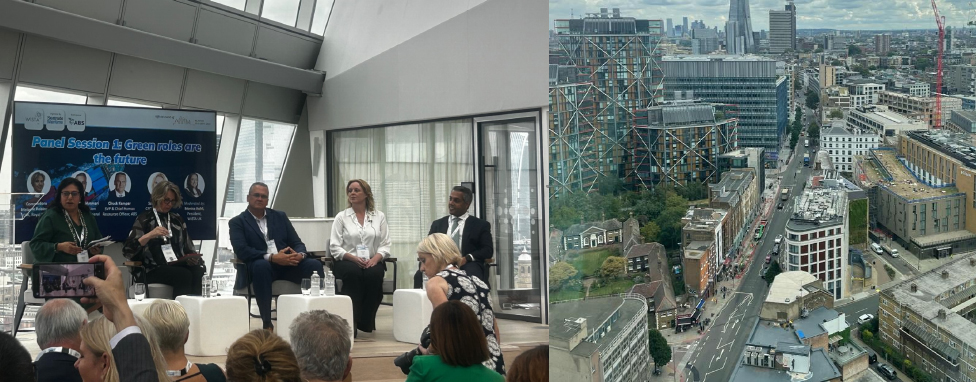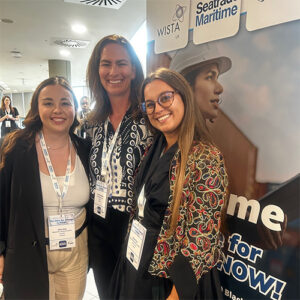Changing Course
Share this blog
Latest Maritime Vacancies
Business Development – Shipmanagement – Dubai
Office Manager – London
Shipping Paralegal – London
Shipping Manager – Singapore
Office Administrator – London
LISW 2023 – Attraction & Retention in the Maritime Industry

I was delighted to be able to attend the WISTA UK event on Tuesday 11 September as part of London International Shipping Week. This afternoon event was themed, ‘The time for change is now’, and featured several panel discussions and a ministerial address from Nusrat Ghani MP and Opening Keynote Address by Arsenio Dominguez, Secretary-General Elect, International Maritime Organization (IMO) .

The first session, ‘Green roles are the future’ was chaired by WISTA UK President Monica Kohli and featured the wonderful Commodore Melanie Robinson CBE, who has recently retired after a 30-year career in the Royal Navy and who I had the pleasure of seeing speak at the Midsummer WISTA UK event at the IMO. Also on the panel were Chuck Kemper, SVP & Chief Human Resources Officer at ABS and speaker at the 2022 Spinnaker Maritime HR Conference, Sarah Kenny, CEO, BMT Group, and H.E. Eng. Essam AlAmmari, VP Advisor, Regulation Sector at Transport General Authority.
If green roles are indeed the future, then the maritime industry needs to be looking at how they are attracting and retaining talent in the industry to fill these roles. Certainly, in terms of attracting the younger generation to the industry, there was a concern from Chuck on the panel that there may be a hesitancy to join a sector that is not seen traditionally as being particularly ‘green’.
With this in mind, organisations need to live their values and not greenwash – this is essential for attracting and retaining talent. People expect to join an organisation that has a clear sense of purpose and a clear ESG strategy.
In terms of digitisation, Chuck pointed out that advancing technology in maritime means that the sector is more attractive to the younger generation than it was 10 years ago. As recruitment specialists here at Spinnaker, we are certainly seeing an increase in the requirement for ‘data’ roles that didn’t even exist 10 years ago.
Earlier in the day I attended the event hosted by ShipMoney at the Churchhill War Rooms. Neil Martin, who has headed up the strategy for F1 teams including Ferrari, Red Bull and McLaren and now runs a data & tech business focused solely on offering a competitive advantage to F1 teams, stresses that even just one data person in an organisation can make a difference.
Back at the WISTA event, talk then turned to attracting female talent to the industry. Sarah, along with many other WISTA members are STEM ambassadors and strive to inspire women to join a sector that is almost invisible to graduates. It is surprising that a career in the maritime industry is not promoted as fully as it should be at career fairs or within universities. It’s a well-known fact that 90% of the world’s trade is carried by sea so it is disproportionately underrepresented when it comes to being promoted as a future career choice.
There is also the danger that when we do manage to attract females to the sector, they don’t find anyone they identify with and then we risk losing them.
In terms of increasing female representation within maritime companies, the panel all agreed that ‘quotas’ don’t work. Session chair Monica Kohli asked the panel for any tips or advice for attracting females to the industry. Chuck ran through some of the strategies that ABS had employed to assist with the drive to recruit females to ABS. These included ensuring there is a female on every interview panel, targeting recruiters with finding female candidates as part of a shortlist and a focus on mentoring once female talent has been recruited.
Mel echoed Chuck’s mentoring sentiments and she also placed importance on the presence of positive role models in the industry. She stressed that change takes time and we cannot expect things to happen overnight. She also raised the point that ‘reverse mentoring’ is something she has found beneficial in her career. The younger generation can be more knowledgeable when it comes to green issues and she has allowed them to mentor her.
Sarah reminded us that role models are not always leaders and that we all have duty and responsibility to be ambassadors for the sector and promote the industry to the best of our ability. She felt it would be nice if the maritime industry was eventually viewed as the gold standard and people would be queuing to join the sector.
The theme of attracting talent continued into the 2nd panel session of the day which was moderated by Gina Panayiotou, Secretary General of WISTA UK. This panel was offering a CEO’s guide to ESG. Mark O’Neil, President & CEO of Columbia Group said that as an organisation they have been trying to recruit graduates to the industry. They visited Oxford University in the UK and overwhelmingly the graduates wanted to discuss Columbia’s sustainability vision and ESG strategy over conversations around salary – a sure sign that new recruits to the industry need to find an organisation whose brand values are aligned with their own personal values.
Dr Anil Sharma CEO of the world’s largest buyer of ships for recycling, GMS, echoed words from earlier in the day in that we cannot greenwash. New starters at his organisation are encouraged to visit the shipyards to see for themselves that 97% of the ship is recycled or reused.
Despina Theodosiou, CEO of tech company Tototheo Maritime warned us that we are competing with other industries for data roles, and we need to make the sector attractive. She wants to make sure that technology is there to complement employees, not replace them!
A stark warning was issued as the session closed, from Elisabeth Munck af Rosenschold, Global Sustainability Manager at IKEA, that the urgency of climate change is the biggest issue and the greatest challenge is whether we can all act fast enough.
Article written by Helen McCaughran, Business Development & Marketing, Spinnaker.
London International Shipping Week runs from the 11th – 15th September 2023 and you can view our current sustainability and ESG roles on our website.